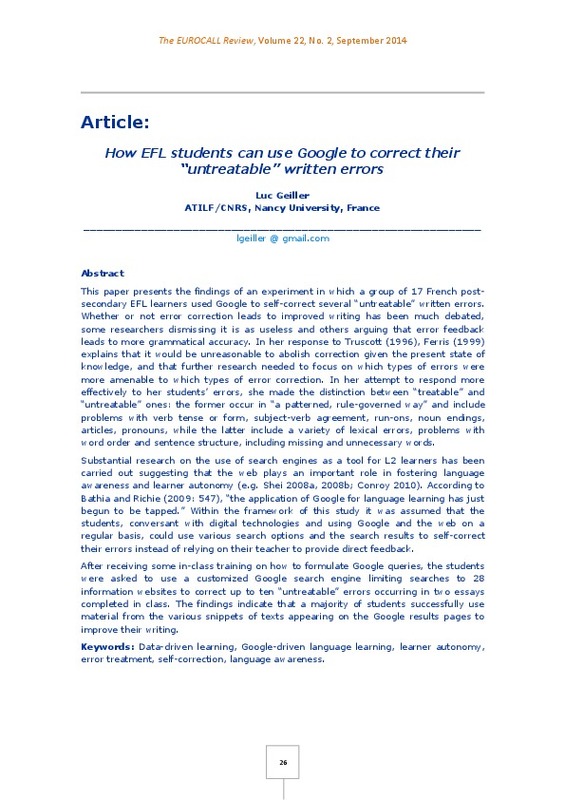JavaScript is disabled for your browser. Some features of this site may not work without it.
Buscar en RiuNet
Listar
Mi cuenta
Estadísticas
Ayuda RiuNet
Admin. UPV
How EFL students can use Google to correct their “untreatable” written errors
Mostrar el registro sencillo del ítem
Ficheros en el ítem
| dc.contributor.author | Geiller, Luc
|
es_ES |
| dc.date.accessioned | 2017-05-25T12:33:19Z | |
| dc.date.available | 2017-05-25T12:33:19Z | |
| dc.date.issued | 2014-09-25 | |
| dc.identifier.uri | http://hdl.handle.net/10251/81755 | |
| dc.description.abstract | [EN] This paper presents the findings of an experiment in which a group of 17 French post-secondary EFL learners used Google to self-correct several “untreatable” written errors. Whether or not error correction leads to improved writing has been much debated, some researchers dismissing it is as useless and others arguing that error feedback leads to more grammatical accuracy. In her response to Truscott (1996), Ferris (1999) explains that it would be unreasonable to abolish correction given the present state of knowledge, and that further research needed to focus on which types of errors were more amenable to which types of error correction. In her attempt to respond more effectively to her students’ errors, she made the distinction between “treatable” and “untreatable” ones: the former occur in “a patterned, rule-governed way” and include problems with verb tense or form, subject-verb agreement, run-ons, noun endings, articles, pronouns, while the latter include a variety of lexical errors, problems with word order and sentence structure, including missing and unnecessary words. Substantial research on the use of search engines as a tool for L2 learners has been carried out suggesting that the web plays an important role in fostering language awareness and learner autonomy (e.g. Shei 2008a, 2008b; Conroy 2010). According to Bathia and Richie (2009: 547), “the application of Google for language learning has just begun to be tapped.” Within the framework of this study it was assumed that the students, conversant with digital technologies and using Google and the web on a regular basis, could use various search options and the search results to self-correct their errors instead of relying on their teacher to provide direct feedback. After receiving some in-class training on how to formulate Google queries, the students were asked to use a customized Google search engine limiting searches to 28 information websites to correct up to ten “untreatable” errors occurring in two essays completed in class. The findings indicate that a majority of students successfully use material from the various snippets of texts appearing on the Google results pages to improve their writing. | es_ES |
| dc.language | Inglés | es_ES |
| dc.publisher | Universitat Politècnica de València | |
| dc.relation.ispartof | The EuroCALL Review | |
| dc.rights | Reconocimiento - No comercial - Sin obra derivada (by-nc-nd) | es_ES |
| dc.subject | Data-driven learning | es_ES |
| dc.subject | Google-driven language learning | es_ES |
| dc.subject | learner autonomy | es_ES |
| dc.subject | Error treatment | es_ES |
| dc.subject | Self-correction | es_ES |
| dc.subject | Language awareness | es_ES |
| dc.title | How EFL students can use Google to correct their “untreatable” written errors | es_ES |
| dc.type | Artículo | es_ES |
| dc.date.updated | 2017-05-25T10:54:47Z | |
| dc.identifier.doi | 10.4995/eurocall.2014.3633 | |
| dc.rights.accessRights | Abierto | es_ES |
| dc.description.bibliographicCitation | Geiller, L. (2014). How EFL students can use Google to correct their “untreatable” written errors. The EuroCALL Review. 22(2):26-45. https://doi.org/10.4995/eurocall.2014.3633 | es_ES |
| dc.description.accrualMethod | SWORD | es_ES |
| dc.relation.publisherversion | https://doi.org/10.4995/eurocall.2014.3633 | es_ES |
| dc.description.upvformatpinicio | 26 | es_ES |
| dc.description.upvformatpfin | 45 | es_ES |
| dc.type.version | info:eu-repo/semantics/publishedVersion | es_ES |
| dc.description.volume | 22 | |
| dc.description.issue | 2 | |
| dc.identifier.eissn | 1695-2618 |








